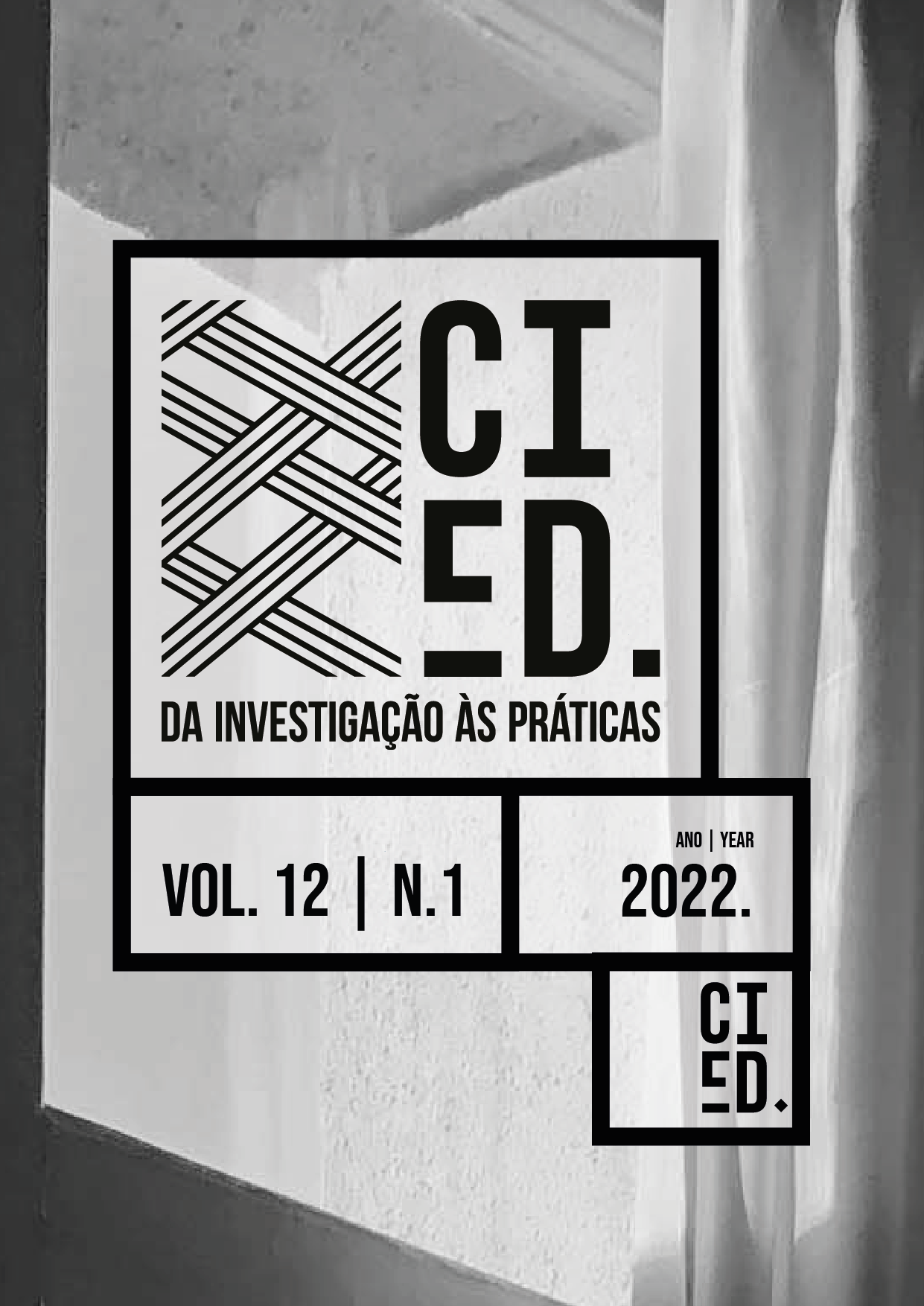The (im)possibilities of different methodologies in Emergency Remote Teaching
DOI:
https://doi.org/10.25757/invep.v12i1.282Abstract
This work presents the report of an internship experience carried out in the subjects of Educational Psychology I and II, at the Faculty of Education of Federal University of Goiás, offered to the Licentiate degree in Biological Sciences, Philosophy and Music, at the academic period 2020/1. Our objective is to emphasize the importance of understanding different methodologies in the promotion of learning, especially in the context of Emergency Remote Teaching, punctuating possibilities and difficulties of teaching in this modality, based on the theoretical framework of the Historical-Critical Pedagogy. The experience reported considered a theoretical background and the (im)possibilities of analysis and intervention in practice as fundamental to qualificate teachers committed to education and the transformation of reality. The conclusion is that the experience was formative for the students, because despite the challenges of Emergency Remote Teaching, the use of diversified methodologies were beneficial.
Downloads
References
Candau, V. M. (2014). Rumo a uma nova didática. São Paulo: Vozes, 2014
Ciavatta, M. O. (2014). Conhecimento histórico e o problema teórico-metodológico das mediações. In: G. Frigotto & M. Ciavatta (Orgs.), Teoria e educação no labirinto do capital (pp. 192-229). São Paulo: Expressão Popular
Coêlho, I. M. (2003). Repensando a formação de professores. NUANCES: estudos sobre educação, 09 (9/10), 47-63. Acesso em 08 de dezembro, 2020, de https://repositorio.bc.ufg.br/bitstream/ri/12753/5/Artigo%20-%20Ildeu%20Moreira%20Co%C3%AAlho%20-%202003.pdf
Gatti, B. A. (2010). Psicologia da educação: conceitos, sentidos e contribuições. Psicologia da Educação, 31, 7-22. Acesso em 15 de novembro, 2020, de http://pepsic.bvsalud.org/scielo.php?script=sci_arttext&pid=S1414-69752010000200002&lng=pt&nrm=iso
Hodges, C. et al. (2020). The Difference Between Emergency Remote Teaching and Online Learning. Educause Review, 2-15. Acesso em 15 de novembro, 2020, de https://er.educause.edu/articles/2020/3/the-difference-between-emergency-remote-teaching-and-online-learning
Horta, N. B. (2015). O meme como linguagem de internet. 191 f. Dissertação (Mestrado em Comunicação). Universidade de Brasília, Brasília-DF
Joye, C. R.; Moreira, M. M., & Rocha, S. S. D. (2020). Educação a Distância ou Atividade Educacional Remota Emergencial: em busca do elo perdido da educação escolar em tempos de COVID-19. Research, Society and Development, 9(7), 1-29. Acesso em 08 de dezembro, 2020, de https://doi.org/10.33448/rsd-v9i7.4299
Reich, J. et. al. (2020). Remote learning guidance from state education agencies during the COVID-19 pandemic: a first look. Teaching Systems Lab, 1-17. Acesso em 16 de novembro, 2020, de https://www.researchgate.net/publication/340392844_Remote_Learning_Guidance_From_State_Education_Agencies_During_the_COVID-19_Pandemic_A_First_Look
Manfredi, S. M. (1993). Metodologia do ensino: diferentes concepções. Campinas-SP: FE/UNICAMP, (na imprensa), 6p.
Masetto, M. T. (2003). Competência Pedagógica do Professor Universitário. São Paulo: Summus Editorial
Miranda, M. G., & Resende, A. A. (2008). A psicologia da educação na perspectiva da relação teoria e prática. Escritos de psicologia, educação e cultura. Goiânia, GO: UCG
Moreira, D. A. (2002). O método fenomenológico na pesquisa. São Paulo: Pioneira Thomson
Nemer, F. U., & Almeida, T. A. (2020). Novas tecnologias digitais no ensino remoto: avaliação do uso por alunos de um curso de mestrado. Recite, 5 (especial), 56-58. Acesso em 16 de novembro, 2020, de https://recite.unicarioca.edu.br/rccte/index.php/rccte/article/view/122
Pimenta, S. G.; Lima, M. S. L. (2006). Estágio e docência: diferentes concepções. Revista Poiésis, 3 (3/4), 5-24. Acesso em 08 de dezembro, 2020, de https://www.revistas.ufg.br/poiesis/article/view/10542
Sá, A. C. A. M. et al. (2020). Diretrizes gerais: Orientações didático-pedagógicas para a organização do ensino remoto na UFG [Ebook]. Goiânia, GO: UFG
Saviani, D. (1996). Os saberes implicados na formação do educador. In M. A. Bicudo, & C. A. Silva Junior (Orgs.), Formação do Educador: dever do Estado, tarefa da Universidade (pp. 39-50). São Paulo: UNESP
Saviani, D. (2009). Educação: do senso comum à consciência filosófica. 18. ed. Campinas, SP: Autores Associados
Saviani, D. (2018). Escola e democracia. Campinas, SP: Autores Associados.
Universidade Federal de Goiás (2000). Fixa o currículo pleno do curso de Licenciatura em Música. Resolução CEPEC n. 532, de 07 de novembro de 2000. Acesso em 08 de dezembro, 2020, de https://files.cercomp.ufg.br/weby/up/269/o/Resolucao_CEPEC_2000_0532-MUSLICanterior.pdf
Universidade Federal de Goiás (2008). Fixa o currículo pleno do curso de graduação em Filosofia - Modalidades Bacharelado e Licenciatura. Resolução CEPEC n. 862, de 10 de janeiro de 2008. Acesso em 16 de novembro, 2020, de https://files.cercomp.ufg.br/weby/up/107/o/Resolucao_Nova_862.pdf
Universidade Federal de Goiás. Projeto Pedagógico Complementar do Curso de Licenciatura em Psicologia, grau acadêmico Bacharelado e Licenciatura, Goiânia, GO, 2014. Disponível em: https://files.cercomp.ufg.br/weby/up/2/o/PPC_Psicologia_-_Licenciatura_-_2014.pdf. Acesso em: 16 nov. 2020
Universidade Federal de Goiás. Aprova o Projeto Político Pedagógico do Curso de Graduação em Ciências Biológicas, grau acadêmico Licenciatura. Resolução CEPEC n. 1.527, de 13 de julho de 2017. Disponível em: https://files.cercomp.ufg.br/weby/up/99/o/PPC_Licenciatura_Ci%C3%AAncias_Biol%C3%B3gicas_.pdf?1427467963. Acesso em: 16 nov. 2020
Universidade Federal de Goiás. Divulgadas normativas para atividades acadêmicas no modo de ensino remoto. Notícias, 19 de agosto de 2020. Disponível em: https://reitoriadigital.ufg.br/n/132139-divulgadas-resolucoes-e-diretrizes-sobre-atividades-academicas-no-ensino-remoto. Acesso em: 16 nov. 2020
Veiga, I. P. A. (2020). Repensando a didática. Campinas, SP: Papirus
Downloads
Published
How to Cite
Issue
Section
License
Copyright (c) 2022 Sheila Daniela Medeiros dos Santos, Amanda Ingrid Santos Lima, Lívia Maria Teran Cavalcanti, Ana Paula Kunzler, Jordana de Castro Balduíno Paranahyba

This work is licensed under a Creative Commons Attribution 4.0 International License.
Articles published or submitted to Da Investigação às Práticas are licensed according to Creative Commons Attribution License (CC BY 4.0). Authors agree that:
Copyrights of all articles published are retained by authors with first publication copyright granted to the journal.
All articles are under the Creative Commons Attribution License recognizing the authorship of the publication and identifying that first publication took place in this journal.
Authors have the right to free distribute or make available in private or institutional pages the version published by Da Investigação às Práticas: Estudos de Natureza Educacional provided the original proper citation.
The journal only accepts articles not published previously (except in the form of an abstract or as part of academic thesis), that it is not under consideration for publication elsewhere. After published, the article cannot be published again partial or totally without the editorial board consent.





 e-ISSN: 2182-1372
e-ISSN: 2182-1372